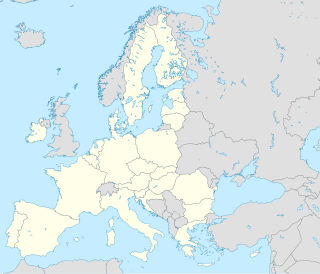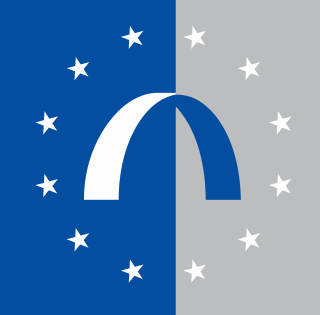
Eurostat is a Directorate-General of the European Commission located in the Kirchberg quarter of Luxembourg City, Luxembourg. Eurostat’s main responsibilities are to provide statistical information to the institutions of the European Union (EU) and to promote the harmonisation of statistical methods across its member states and candidates for accession as well as EFTA countries. The organisations in the different countries that cooperate with Eurostat are summarised under the concept of the European Statistical System.

The European Agency for Safety and Health at Work (EU-OSHA) is a decentralised agency of the European Union with the task of collecting, analysing and disseminating relevant information that can serve the needs of people involved in safety and health at work. Set up in 1994 by Council Regulation (EC) No 2062/94 of 18 July 1994, EU-OSHA is based in Bilbao, Spain, where it has a staff of occupational safety and health, communication and administrative specialists. Dr Christa Sedlatschek is the current Director of EU-OSHA, following on from Dr Jukka Takala in September 2011.

The European Union plays a minor and mostly indirect policy role in sport, because (a) sport is normally considered to be outside the competences conferred by the member states to the European Union and (b) sport is in general organised internally, on a European continental level, or globally.

The European Trade Union Confederation (ETUC) is the major trade union organisation representing workers at the European level. European integration has reinforced the EU's role in economic, employment and social policy throughout the 27 member states. The ETUC is a European social partner, which means that the European Commission consults it when developing social and economic policies. It also negotiates autonomous agreements and work programmes with European employers. And it coordinates the national and sectoral policies of its affiliates on social and economic matters, particularly in the framework of the EU institutional processes, including European economic governance and the EU Semester.

Directorate-General for Communications Networks, Content and Technology is a Directorate-General of the European Commission. DG Connect is responsible for managing the Digital Agenda.

The European Structural and Investment Funds are financial tools set up to implement the regional policy of the European Union. They aim to reduce regional disparities in income, wealth and opportunities. Europe's poorer regions receive most of the support, but all European regions are eligible for funding under the policy's various funds and programmes. The current Regional Policy framework is set for a period of seven years, from 2021 to 2027.

The Joint Research Centre (JRC) is the European Commission's science and knowledge service which employs scientists to carry out research in order to provide independent scientific advice and support to EU policy. The JRC is a Directorate-General of the European Commission under the responsibility of Mariya Gabriel, European Commissioner for Innovation, Research, Culture, Education and Youth. The current Director-General of the JRC is Stephen Quest, who took office on 01/05/2020, succeeding Vladimír Šucha. Its Board of Governors assists and advises the Director-General on matters relating to the role and the scientific, technical and financial management of the JRC.

The European Food Safety Authority (EFSA) is the agency of the European Union (EU) that provides independent scientific advice and communicates on existing and emerging risks associated with the food chain. EFSA was established in February 2002, is based in Parma, Italy, and for 2021 it has a budget of €118.6 million, and a total staff of 542.

The European Monitoring Centre for Drugs and Drug Addiction (EMCDDA) is an agency of the European Union located in Lisbon, Portugal. Established in 1993, the EMCDDA strives to be the "reference point" on drug usage for the European Union's member states, and to deliver "factual, objective, reliable and comparable information" about drug usage, drug addiction and related health complications, including hepatitis, HIV/AIDS and tuberculosis.
The Institute for Prospective Technological Studies (IPTS), located in Seville, Spain, is one of the seven institutes of the Joint Research Centre (JRC), a Directorate-General of the European Commission (EC).
The European Local Transport Information Service (ELTIS) is a non-profit European portal for local transport news and events, transport measures, policies and practices implemented in cities and regions in Europe.
The objective of the European Union Public Health Information and Knowledge system is to develop a sustainable system to integrate and present public health information and knowledge for policy makers, academics and public health specialists at a European, national and regional level. Its objectives are to deliver a technical web system, publishing protocols and an expert network, all facilitating the production and regular updates of data presentations and text for the [www.EUPHIX.org] website. It is publicly accessible and has ‘deep links’ to the Public Health-EU portal. It serves as an information & knowledge exchange platform, but also as an example of how public health information can be presented in a dynamic and interactive fashion.

India.gov.in is the Indian government’s web portal for citizens. It presents information resources and online services from government sources, accessible from a single point. It is also known as the National Portal of India.
Design for All in the context of information and communications technology (ICT) is the conscious and systematic effort to proactively apply principles, methods and tools to promote universal design in computer-related technologies, including Internet-based technologies, thus avoiding the need for a posteriori adaptations, or specialised design.
The Alpine Space Programme is a transnational cooperation programme in the framework of the European Union cohesion policy. In this programme national, regional and local stakeholders from the participating countries in the Alpine space cooperate on various transnational projects. The major objective of the Alpine Space Programme is to make the cooperation area more attractive and competitive through joint activities in those subject areas in which transnational cooperation is required for sustainable solutions.
All European countries show eGovernment initiatives, mainly related to the improvement of governance at the national level. Significant eGovernment activities also take place at the European Commission level as well. There is an extensive list of eGovernment Fact Sheets maintained by the European Commission.
The European Migration Network (EMN) is an EU funded network, set up with the aim of providing up-to-date, objective, reliable and comparable information on migration and asylum for Institutions of the European Union, plus authorities and institutions of the Member States of the European Union, in order to inform policymaking. The EMN also serves to provide the wider public with such information. The EMN was established by the Council of the European Union Decision 2008/381/EC adopted on 14 May 2008.
Consolidating the former EU Open Data Portal and the European Data Portal, data.europa.eu is the European Union’s services package to promote the reuse of open data from its institutions’ and EU Member States’ among its citizens, businesses and other organisations.

Transparency of media ownership refers to the public availability of accurate, comprehensive and up-to-date information about media ownership structures. A legal regime guaranteeing transparency of media ownership makes possible for the public as well as for media authorities to find out who effectively owns, controls and influences the media as well as media influence on political parties or state bodies.






